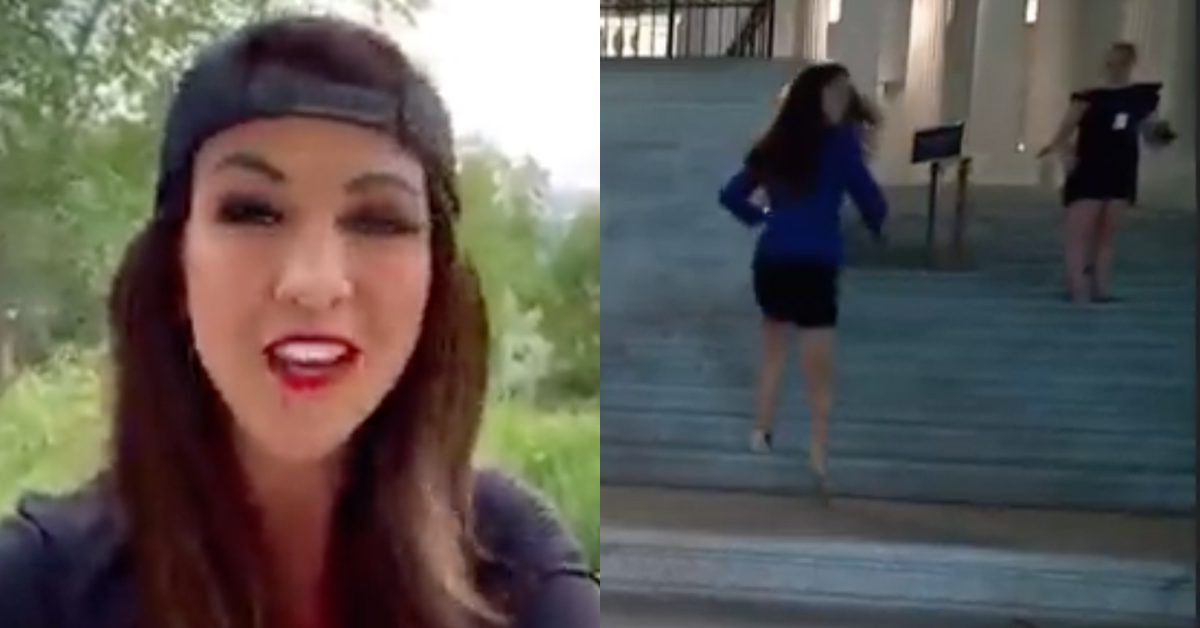Video evidence contradicts Colorado Republican Representative Lauren Boebert's claim that she intentionally missed a crucial debt ceiling vote as a form of "silent protest."
Boebert has been an outspoken critic of the debt ceiling bill signed into law by President Joe Biden. The legislation suspends the nation's debt limit until January 1, 2025, to prevent a default that could have severe global economic consequences.
Boebert's office previously stated that she had filed a "missing vote" form indicating her intention to vote against the bill, and her opposition was recorded in the Congressional Record.
On Twitter, Boebert derided the bill as "more DC self-created garbage that [she] will always fight against" and in an accompanying video, she claimed she was "ticked off because they wouldn't let me do my job so I didn't take the vote."
She added:
"Call it a no-show protest but I certainly let my colleagues and the country know I was against this garbage of a bill."
You can hear what she said in the video below.
\u201cCall it a protest \u2014 there\u2019s absolutely no way to ever justify adding another $4-6 trillion in debt. \n\nThis is more DC self-created garbage that I will always fight against.\u201d— Lauren Boebert (@Lauren Boebert) 1685816379
However, as the Twitter community note on Boebert's video makes clear, there's video showing Boebert rushing up the Capitol steps while a CNN reporter informs her that the vote had already concluded.
In the footage, Boebert expresses surprise upon learning that she missed the vote and continues ascending the steps.
The video came from CNN Associate Producer Morgan Rimmer, who confirmed Boebert "kept running up the stairs" even though she told her "it had closed already."
You can see the video below.
\u201cHere is a clip from that night outside the Capitol, showing Rep. Boebert running up the stairs as though she was trying to make the vote, and me telling her that it had closed already. \n\n*running up steps*\nMe: They closed it. \nBoebert: They closed it?\n*keeps running*\u201d— Morgan Rimmer (@Morgan Rimmer) 1685900230
Boebert was swiftly criticized for her dishonesty.
Many accused her of attempting to deflect from her failure to fulfill her duties as a Representative.
\u201c@laurenboebert Didn't show up for work. Real brave.\u201d— Lauren Boebert (@Lauren Boebert) 1685816379
\u201c@laurenboebert Do you even know what you\u2019re talking about half the time, or do you just like trying to stay relevant so you post things that make no sense?\u201d— Lauren Boebert (@Lauren Boebert) 1685816379
\u201c@laurenboebert You are DC self-created garbage windbag who cared so much about the debt ceiling you didn\u2019t bother to show up for the vote. \n\nSit back down.\u201d— Lauren Boebert (@Lauren Boebert) 1685816379
\u201c@laurenboebert You did nothing as a member of Congress @laurenboebert\u2026\n\nHow can you put up this video when you didn\u2019t show up to vote?\nNO SHOW!!! \n\nYou didn\u2019t want to be tied to either a NO vote or a YES vote, you played the middle to protect yourself.\u201d— Lauren Boebert (@Lauren Boebert) 1685816379
\u201c@laurenboebert Yes doing nothing as a member of Congress is definitely fighting for Americans \ud83d\ude44\u201d— Lauren Boebert (@Lauren Boebert) 1685816379
\u201c@laurenboebert You were late \ud83e\udd23 you need to hold yourself accountable\u201d— Lauren Boebert (@Lauren Boebert) 1685816379
\u201c@laurenboebert Busted. Trying to spin slack into something\u201d— Lauren Boebert (@Lauren Boebert) 1685816379
Both chambers of Congress recently passed the bipartisan agreement to raise the national debt ceiling and avert a historic default, which Biden signed over the weekend.
The legislation will suspend the debt ceiling until January 1, 2025, providing more time to address the issue after the 2024 presidential election.
It includes spending caps, expedited energy project permitting, the clawback of unused COVID-19 funds, and expanded work requirements for food aid programs. The bill's success hinged on garnering support from both Republicans and Democrats in Congress, and was widely seen as a win for President Biden who managed to keep spending cuts far below what Republicans had originally sought while also pushing the debt ceiling can down the road beyond the 2024 election.
 SECONDNEXUS
SECONDNEXUS percolately
percolately georgetakei
georgetakei comicsands
comicsands George's Reads
George's Reads








